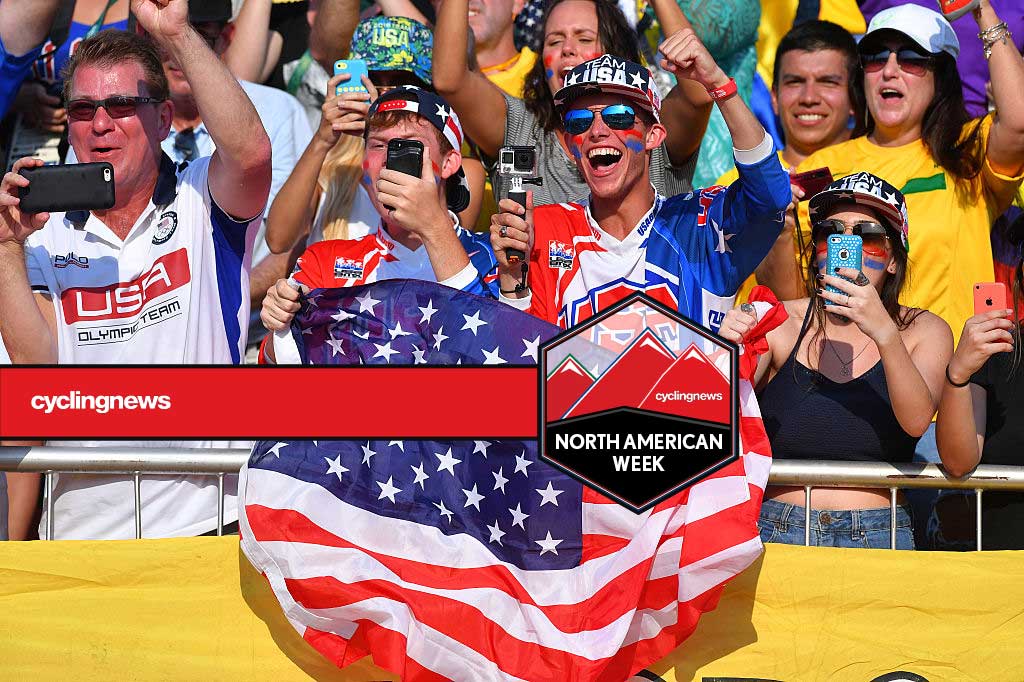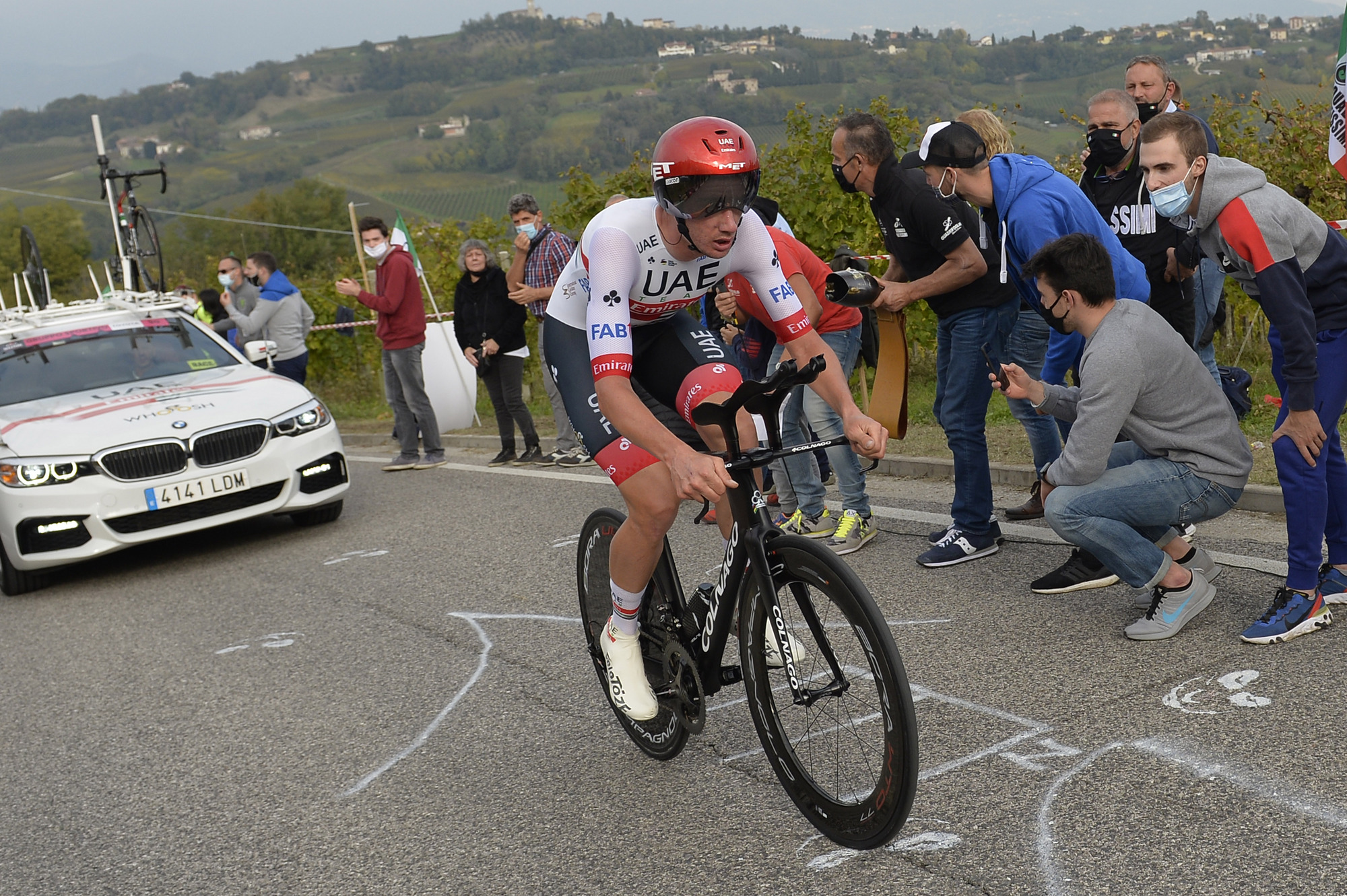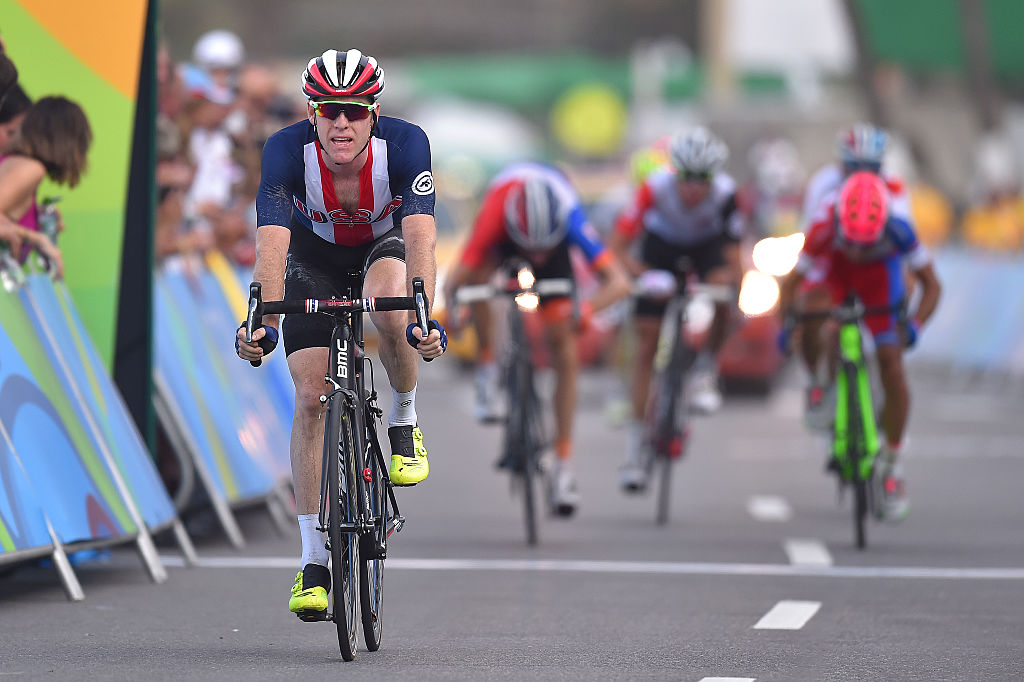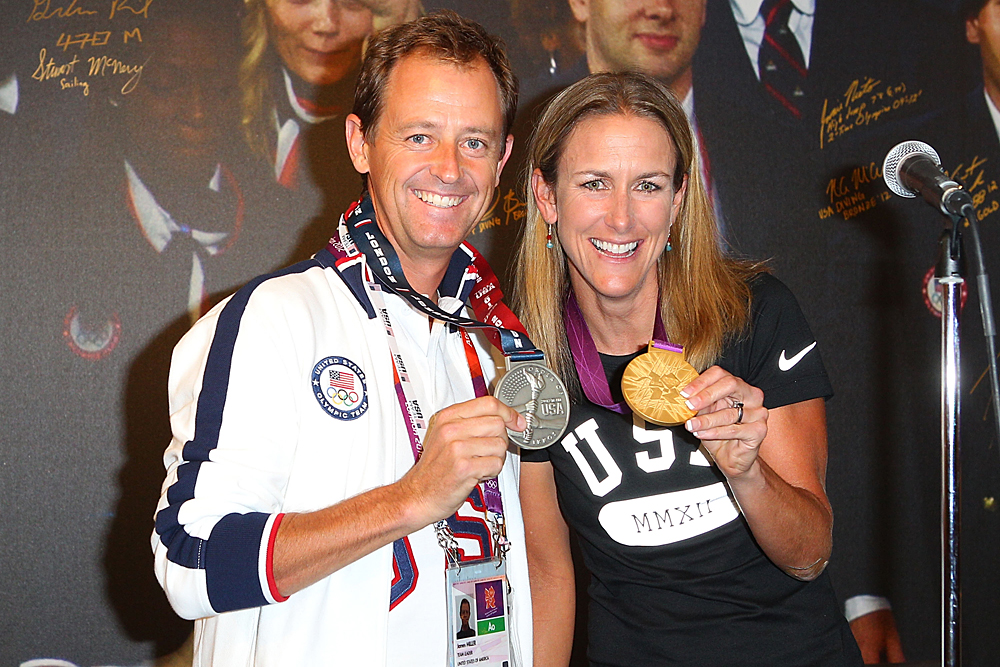Olympic Games for US men's road team: Making do with two
USA Cycling's uphill battle with ever-shrinking team size for Tokyo

This story forms part of our North American week on Cyclingnews.
It's an Olympic year in 2021 and USA Cycling has again turned its focus toward seeking gold, silver and bronze. However, the men's road team's chance of turning around a rather poor Olympic record of recent years has been slashed yet again after securing just two places for male road riders, well down from the maximum of five that the strongest nations will field.
Cyclingnews spoke to USA Cycling's returned Head of Elite Athletics, Jim Miller, who swept in at the eleventh hour to put the country on track for its ambitious goals, about what's been holding the men's Olympic road team back and how he plans to make the most of a tiny two-man team.
For the United States, 1984 was the Olympic Games heyday for cycling and the only year the country has ever taken a medal in the elite men's road race when Alexi Grewal claimed the gold medal ahead of Canada's Steve Bauer and Dag Otto Lauritzen (Norway).
Since then, Bob Mionske (1988), Frankie Andreu (1996) and Taylor Phinney (2012) have finished just off the podium in fourth but no male road rider has stood on the podium at the Olympic Games.
The time trial has treated the country better even if Tyler Hamilton was stripped of his gold medal from 2004 and Lance Armstrong his bronze from 2000 for doping.
Bobby Julich won silver in 2004, Levi Leipheimer claimed bronze in 2008 but the country's women have historically outclassed the men. Connie Carpenter and Rebecca Twigg won gold and silver in the '84 Los Angeles Games, Kristin Armstrong won gold three times in the time trial in 2008, 2012 and 2016. Mari Holden and Dede Barry won silver in 2000 and 2004, respectively.
The latest race content, interviews, features, reviews and expert buying guides, direct to your inbox!
Miller says that he rejoined USA Cycling after a two-year stint working for Training Peaks specifically to target an 'audacious' number of Olympic medals from a plan they laid out after the 2016 Games in Rio.
"We think we're capable of winning seven medals, we want to win seven medals," Miller says of all the disciplines - track, mountain bike, road and BMX.
"That means you have to target and have realistic opportunities for eight to 10 medals. In the last two decades, a lot of nations have earned six, but nobody's earned seven, with the exception of Great Britain, and they're in another class by themselves, both in performance and financially."
USA Cycling has been consistent in its medal count in Miller's tenure, taking five in Beijing (Leipheimer, Kristin Armstrong and three in BMX), four in London (Armstrong, Georgia Gould - bronze in MTB XC and two on the track, Sarah Hammer won silver in the omnium and the women took silver in team pursuit) and five in 2016 in Rio (Armstrong - gold, the same two silvers on the track and a gold in men's BMX by Connor Fields).
There was a very good chance for another from Mara Abbott, who was caught heartbreakingly close to the line and out-sprinted by Anna van der Breggen, Emma Johansson and Elisa Longo Borghini, and two BMX riders were fourth.
"We had a good Olympics in London and Rio with I think opportunities to get to six or seven medals. We missed on a couple. If we get those then you know, we're right there."
Step 1: Qualifying spots

While the US women's road team has earned enough points to qualify the maximum number of places for both the road race and time trial, the situation for the men has been much tougher.
The US men qualified only two places for each road event in 2016 and the same for Tokyo. The 142 athlete quota is decided by the UCI's World Rankings for Nations from 2019 (October 22, 2018 to October 22, 2019) where the USA was a distant 26th.
Having only two riders in the road race is a disadvantage, especially in a race of 234km with 4,865 metres of climbing including Mount Fuji.
In 2019, most of the US men's points came from Tejay van Garderen, thanks to his second overall in the Critérium du Dauphiné and his time leading the Tour of California, Brandon McNulty (winner of Tour of Sicily) and Joe Dombrowski for his 12th in the Giro d'Italia and third place in Tour of Utah.
"Honestly, I'm not a fan of the 12-month qualifying process," Miller says.
"That's a really brief period of time, and you're going to get a majority of your UCI points from the Grand Tours. And if you don't have a Grand Tour contender, then you're just out of points. It gets really difficult."
The riders don't have to win WorldTour races or even Grand Tours - Ecuador, home to 2019 Giro d'Italia winner Richard Carapaz, also only earned two spots - but riders do have to consistently score points. That has become and will continue to be more difficult for Americans since so many of the higher-ranked UCI races in North America have vanished. The greater depths of the fields in Europe puts most US men into a position of helper, which isn't conducive to points scoring.
Whether USA Cycling as a federation can do anything to change the situation is complicated.
"I think where we sit is in the men's development pathways, is providing them opportunities, getting them a lot of European experience, so that they have an opportunity to go into professional teams," Miller says of USA Cycling's role.
"Once they go to that professional level, there's a whole other level of development that has to take place there for them to be elite world class ... that we can't provide that because we don't have that infrastructure."
Miller says USA Cycling can tell riders and teams where they're ranking and encourage them to try to score more points but while that might work for a US-based team like EF Education-Nippo, it might not fly for other WorldTeams.
"I think we've been pretty proactive, at least keeping the men updated where they were at in the selection process. For me, that was primarily leading into Rio. I didn't have much to do with it leading into 2021 because when I came [back], most of it was done already.
"I think the guys know that ultimately, they have to score points."
Step 2: Build the team

Once the riders have scored their points and the US Olympic and Paralympic Committee have been awarded its athlete quota for the cycling events, it's time for USA Cycling to build its team.
The 'long team' for the Olympics was announced last year and the men's road long team notably excluded several prominent US WorldTour riders: Ben King, Chad Haga, and Joey Rosskopf - all of whom have either won or come second in a Grand Tour stage - and others like Brent Bookwalter and Larry Warbasse.
"I was pretty upset about it, actually," King told Cyclingnews when he heard the announcement.
The Olympics, he says, are a "massive career goal". But he acknowledged that with only two spots it would be difficult for him to be selected because riders who do the road race must fill the time trial slots.
"The only chance would be either to step up my time trialling game immensely, or to establish myself as a real candidate for a result in the road race, or to show that I have the tactical value to the team to be there for the road race."
Rosskopf was also surprised to be left off.
"I thought there was a chance. I was confused about why they even released the long list to begin with. It was so far out. But I did think I would be on that ... they just have such a talented, younger group of riders that they do deserve to go, so it doesn't really bother me either."
Miller emphasised that the long team was drawn up before he returned and that he has no part in the selection process. But he added the long team is still open until the final selection date.
"It's not at all closed, and people can still qualify ... So hopefully, Haga, Rosskopf can get their name on the long team and they're part of the final team selection - at least the final team discussion."
He added that the team has two spots for the time trial thanks to Lawson Craddock's sixth place at Worlds in 2019. Craddock made the long team along with Vuelta a España stage winner Sepp Kuss, arguably one of the top climbers in the world, US TT champion Ian Garrison, US road race champion Alex Howes, McNulty, Neilson Powless and Van Garderen.
The two riders will be selected, of course, on results. But Miller will also consider the Tokyo courses and how he thinks the race might play out.
Miller says he asks, "How do we get a result? What's our best opportunity for a result? Is it making selections on the climb, and that forces the outcome? Then you're looking at somebody that can make the selection on the climb. If we don't have anybody that can make the selection, and you have to get in the group before the climb, then that's a different type of rider. If it's a course where we have no chance then we may just automatically look at the time trial as the real opportunity.
"It really always depends on how we think we can race the course to our best abilities, and what sort of personnel is required within those tactics to do that."
With a climb like that of the Mount Fuji circuit, Sepp Kuss seems an obvious choice, so too does Brandon McNulty, who came third behind Filippo Ganna and Rohan Dennis in the Giro d'Italia time trial in Valdobbiadene last year.
However until Millar visits the Tokyo road courses in person, he is "a little bit cautious on saying what it is or isn't."
"I'm that guy that has to see the course and know what it is. And then I can have a much better opinion about something," Millar makes clear.
The other complicating factor for the Olympic selection is the possibility of racing getting derailed again by the COVID-19 pandemic.
"If the Olympics are going to go on and there's no racing happening, then you're still going to have to make selections, we have started to discuss how we want to handle that if there is no racing to use and evaluate," Miller says.
"There are also a lot of other things to consider, too, like what if somebody is not able to attend an event, because they have COVID-19, or they tested positive and they can't travel. There are a lot of the sort of sidebars of what-ifs that we're trying to work through and determine how we would manage it or handle it."
Step 3: Profit

The majority of USA Cycling's funding comes from the USOPC, who allocates its funds based upon the medal capabilities of each sport. This increases the pressure to achieve Olympic medals significantly.
"So if you can win medals, and you can demonstrate you're capable of winning medals, and you can demonstrate a pool of future medal capability, they're more inclined to invest in you than not investing," Miller explains. "So we have an emphasis on performing and winning medals."
Looking down the road, the 2024 quotas have shrunk to just 90 riders for each gender's road events. The men have lost 40 starting positions, while the women have gained 23, with a net loss of 17 road athlete places for the Paris Olympic Games.
Miller is looking on the bright side for the new gender parity.
"I love the equity personally. The majority of my concern is not actually qualifying a full men's team, as much it is developing more women in the WorldTour women's teams," he says.
"I think a bigger concern for me is just the lack of depth we have at that elite [women's] level right now. And we've always had a lot of depth. So for me, that's a bigger concern.
"I think that equity is awesome. What I do hope is that they shorten the men's race to something more reasonable - 90 guys and 250k - with the 130 guys we have now, 250km is a long way. I would love to see that be a shorter race, maybe, maybe even 150km and it's just racing from the gun.
"I don't think that really changes much for us on the women's side. We historically always had full teams. But I do know how difficult that tactic is with four riders to try to manage a race and create an outcome that you're after. So I think for the men, it's just going to make it a more exciting race, more unpredictable, more difficult to control and maybe that chaos gives us a little bit more of an opportunity to be a player in those races."
A more worrying development is the loss of races like Tour of California, where the European pros coming over aren't targeting it perhaps as seriously as other WorldTour races, making it a bit easier for the US men to score points.
"For the health of the sport, you need races and you need opportunities. Sending the entire country to Europe to race bikes is not the best situation," Miller points out.
"You would love to have a great set of races in America that athletes can race in and develop. It's also good for pro teams, it makes the racing here really competitive, and that creates great development opportunities for young riders. So it is super important."
Although gravel racing seems to have taken over the US cycling scene in recent years, Miller says that competition will shift the balance back toward the road in all likelihood.
"The cost of running events is getting more and more expensive and there is more competition to host an event with a city - you have running, triathlons, crossfits, Spartan races, gravel races, everything is competing with one another for those cities' weekends," he says.
Gravel racing has the appeal of usually being well outside city limits and having less conflicts with other events. But, he says: "When one thing goes up, something else goes down. And when something goes down, that's where the opportunity lies. So you get the really entrepreneurial promoters who think 'there's no stage racing. If I host a stage race, I have no competition'. And everybody comes back.
"So you'll see, I think you'll see the competition for gravel increases and some of those organisers see the opportunity of road racing, and they'll come back, put together a road race, because you know, it is fun to race your bike fast. The appeal of going fast will come back. Hopefully, that is what sort of swings that pendulum on the road racing."
Until then, the focus is on Tokyo and the audacious goals that Miller intends to meet.
"We think we're capable of winning seven medals, and that means you have to target eight to 10 medals and have realistic opportunities in eight to 10 medals," he says.
"I think we have the athletes capable of performing on those days. I think we have a staff that's very experienced and knowledgeable and capable of leading athletes. I think it's well within our wheelhouse but it hasn't been done but by anybody with the exception of GB - so that just goes to show you how difficult it is.
"Another goal we put out for ourselves was to win a medal in every discipline. Since BMX has been introduced to the Olympic Movement, no nation has won a medal on every discipline. I think we're capable of doing that.
"Then, there's an unofficial category, women's medals. Nobody tracks it, so you won't see it on USA Today, you won't see USOC discussing it. But I think we're very proud of our women's programmes and our women's performances. And we'd like to win the medal count amongst the women. Those two top nations you have are GB and the Netherlands and we've always been second or third to both those nations. And I think just sort of a feather in the cap would be to win that official category - I think it would be a nice feather in the cap for our women."

Laura Weislo has been with Cyclingnews since 2006 after making a switch from a career in science. As Managing Editor, she coordinates coverage for North American events and global news. As former elite-level road racer who dabbled in cyclo-cross and track, Laura has a passion for all three disciplines. When not working she likes to go camping and explore lesser traveled roads, paths and gravel tracks. Laura specialises in covering doping, anti-doping, UCI governance and performing data analysis.